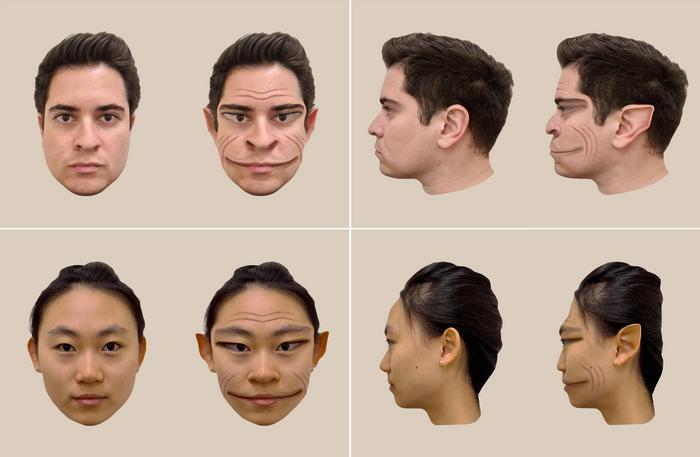Imagine if every time you saw a face, it appeared distorted. Well, for those who have a very rare condition known as prosopometamorphopsia (PMO), which causes facial features to appear distorted, that is reality.
As the Dartmouth-based website about prosopometamorphopsia explains, “‘Prosopo’ comes from the Greek word for face ‘prosopon’ while ‘metamorphopsia’ refers to perceptual distortions.”’ Specific symptoms vary from case to case and can affect the shape, size, color, and position of facial features. The duration of PMO also varies; it “can last for days, weeks, or even years.”
A new Dartmouth study published in the “Clinical Pictures” section of The Lancet reports on a unique case of a patient with PMO. The research is the first to provide accurate and photorealistic visualizations of the facial distortions experienced by an individual with PMO.

Credit: Images provided by A. Mello et al.
Imagine if every time you saw a face, it appeared distorted. Well, for those who have a very rare condition known as prosopometamorphopsia (PMO), which causes facial features to appear distorted, that is reality.
As the Dartmouth-based website about prosopometamorphopsia explains, “‘Prosopo’ comes from the Greek word for face ‘prosopon’ while ‘metamorphopsia’ refers to perceptual distortions.”’ Specific symptoms vary from case to case and can affect the shape, size, color, and position of facial features. The duration of PMO also varies; it “can last for days, weeks, or even years.”
A new Dartmouth study published in the “Clinical Pictures” section of The Lancet reports on a unique case of a patient with PMO. The research is the first to provide accurate and photorealistic visualizations of the facial distortions experienced by an individual with PMO.
The patient, a 58-year-old male with PMO, sees faces without any distortions when they are viewed on a screen and on paper, but he sees distorted faces that appear “demonic” when viewed in-person. Most PMO cases however, see distortions in all contexts, so his case is especially rare and presented a unique opportunity to accurately depict his distortions.
For the study, the researchers took a photograph of a person’s face. Then, they showed the patient the photograph on a computer screen while he looked at the real face of the same person. The researchers obtained real-time feedback from the patient on how the face on the screen and the real face in front of him differed, as they modified the photograph using computer software to match the distortions perceived by the patient.
“In other studies of the condition, patients with PMO are unable to assess how accurately a visualization of their distortions represents what they see because the visualization itself also depicts a face, so the patients will perceive distortions on it too,” says lead author Antônio Mello, a PhD student in the Department of Psychological and Brain Sciences at Dartmouth. In contrast, this patient doesn’t see distortions on a screen. This means that the researchers were able to modify the face in the photograph, and the patient could accurately compare how similar his perception of the real face was to the manipulated photograph. “Through the process, we were able to visualize the patient’s real-time perception of the face distortions,” says Mello.
In their research with other PMO cases, the co-authors state that some of their PMO participants have seen health professionals who wanted to help but diagnosed them with another health condition, not PMO.
“We’ve heard from multiple people with PMO that they have been diagnosed by psychiatrists as having schizophrenia and put on anti-psychotics, when their condition is a problem with the visual system,” says senior author Brad Duchaine, a professor of psychological and brain sciences and principal investigator of the Social Perception Lab at Dartmouth.
“And it’s not uncommon for people who have PMO to not tell others about their problem with face perception because they fear others will think the distortions are a sign of a psychiatric disorder,” says Duchaine. “It’s a problem that people often don’t understand.”
Through their paper, the researchers hope to increase public awareness of what PMO is. For more information about PMO, visit the prosopometamorphopsia website.
Mello ([email protected]) and Duchaine ([email protected]) are available for comment. Daniel Stehr at Dartmouth and Krzysztof Bujarski at Dartmouth-Hitchcock Medical Center also contributed to the study.
###
Journal
The Lancet
Method of Research
Observational study
Subject of Research
People
Article Title
Visualising facial distortions in prosopometamorphopsia
Article Publication Date
21-Mar-2024




